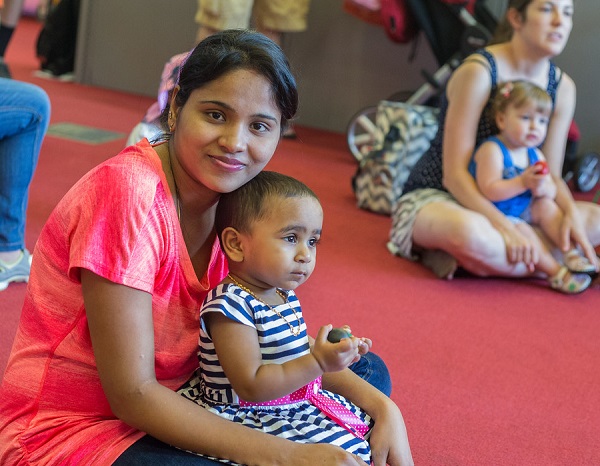
Pittsburgh library language classes deliver communication skills, mental dexterity and culture
When Kathy Wood became intrigued by sign language, she and her husband took classes through Community College of Allegheny County.
“He would often sign to me, and sometimes I would sign back,” she says, laughing. “Or I would answer in English.”
Their sign language skill gained a new significance when the couple adopted a 14-month-old baby girl from China.
“When we got home, of course, we started speaking English to her,” Wood says. “But we found there were times when we knew she could understand us, but she was frustrated by not being able to respond to us.”
The Woods began to teach the baby simple signs: “more,” “again,” “Mommy,” and “Daddy.”
“We found that while she wasn’t proficient, it did help quell the frustration of not being able to tell us exactly what she wanted,” Wood says of her now 17-year-old daughter. “And while it wasn’t perfect, it did help.”
As a senior librarian in the children’s department of Carnegie Library, Wood began teaching a weekly class called Sign Time: Baby Talk at the Oakland library. Her experience with a baby struggling to communicate in a new language translated easily to little ones as they learn to speak.

As one of several language experiences for kids and their families offered through the library system, Sign Time: Baby Talk teaches through songs, play, and books in an informal setting. The class is a short one in deference to a baby’s attention span. A more rigorous class, Storytime: American Sign Language & English, is aimed for kids from babies to 5 years at the Library for the Blind and Physically Handicapped.
Let’s Learn Chinese explores the country’s language and culture through games and other activities. Storytime: English and Spanish, geared for kids ages 3-5 years, incorporates both languages through books, singing, and rhymes. The weekly program operates at the Beechview branch.
The language programming is terrific for bilingual households, who want their kids to retain a link to their ethnic homeland, but English-speaking families benefit, too.
First, at the youngest age, early literary skills are developed through storytime activities. Studies have shown a second language helps increase a child’s mental dexterity, sophistication, and comprehension.
“And it exposes them to a different language and a different culture,” says Mary Beth Parks, children’s services coordinator at Carnegie Library.
The classes include families who are at ease with the language and those who are unfamiliar.
“They have the opportunity to interact and participate not only in the program but afterward, children can play and interact with toys,” Parks says.

Exposure to language and culture helps give kids a more balanced world view, as well as a leg up as they begin taking language classes at school at a younger age. Even primary curriculum often includes a foreign language.
Teens can benefit from Beginning Spanish and Spanish II sessions to reinforce and build on their high school lessons. The classes are intended for adults, but young people may attend. Those planning a semester abroad will find enrichment through programs such as French Language Class for Beginners in Squirrel Hill, Chinese II in Oakland, or Japanese for Beginners.
But for little kids, the library storytime classes are a fine way to ease kids into another language, Wood says.
“Kids are like sponges,” says Wood. “They pick this up so quickly.”